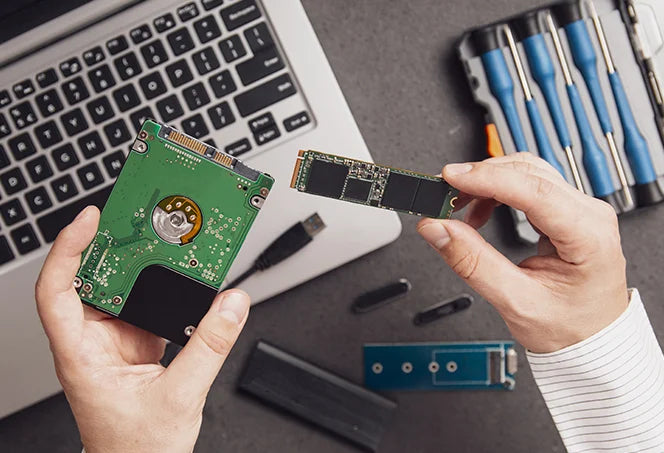Understanding the Key Differences between SSDs and HDDs
In the realm of data storage, two primary contenders stand out: the Solid State Drive (SSD) and the Hard Disk Drive (HDD). Both serve the same purpose of storing your data, but they employ significantly different technologies and offer varying benefits. Understanding their disparities is crucial in making an informed choice for your storage needs.

What is a Solid State Drive (SSD)?
A Solid State Drive (SSD) is a storage device that uses integrated circuit assemblies to store data persistently. Unlike traditional HDDs, SSDs don't have any moving parts. Instead, they utilize flash memory, which allows for faster data access and retrieval. SSDs have gained popularity due to their speed, reliability, and efficiency.
What is a Hard Disk Drive (HDD)?
A Hard Disk Drive (HDD) is a storage device that uses magnetism to store and retrieve digital information on spinning platters coated with a magnetic material. It consists of mechanical components such as spinning disks and read/write heads that move rapidly to access and store data. HDDs have been around for decades and offer large storage capacities at relatively lower costs.
The Key Differences
- Technology: SSDs use flash memory, while HDDs use spinning disks and mechanical components.
- Speed: SSDs are significantly faster in terms of data access, resulting in quicker boot times, file transfers, and overall system responsiveness.
- Durability: SSDs are more durable as they lack moving parts, making them less susceptible to physical damage from drops or vibrations.
- Noise and Heat: SSDs generate less heat and noise compared to HDDs, which can become audible due to spinning disks.
- Cost and Capacity: HDDs generally offer higher storage capacities at a lower cost per gigabyte compared to SSDs. However, SSD prices have been gradually decreasing over time.
Pros and Cons
Solid State Drives (SSDs)
Pros:
- Exceptional speed and performance
- Durability due to lack of moving parts
- Low power consumption
- Reduced heat and noise
Cons:
- Generally more expensive per gigabyte compared to HDDs
- Limited maximum storage capacity (although increasing with technological advancements)
Hard Disk Drives (HDDs)
Pros:
- Larger storage capacities available at lower costs
- Well-established technology with proven reliability over time
Cons:
- Slower read/write speeds compared to SSDs
- More susceptible to physical damage due to moving parts
- Generate more heat and noise
Which Should You Choose?
Your choice between SSDs and HDDs depends on your specific needs and budget. If speed, durability, and noise reduction are paramount, an SSD might be the ideal choice despite being more expensive. However, if you require higher storage capacities at a lower cost and can compromise on speed, an HDD could be more suitable.
In many cases, a hybrid approach is also adopted, where an SSD serves as the primary drive for operating systems and frequently used applications, while an HDD provides bulk storage for less frequently accessed data.
Ultimately, both SSDs and HDDs have their merits and limitations. Assessing your requirements and considering factors like speed, capacity, cost, and intended usage will guide you towards the optimal choice for your storage needs.

